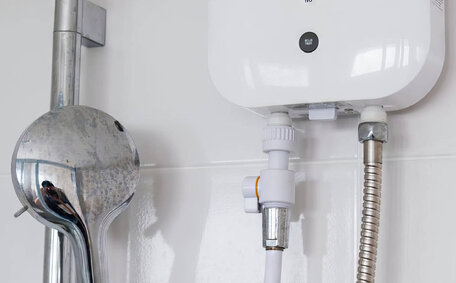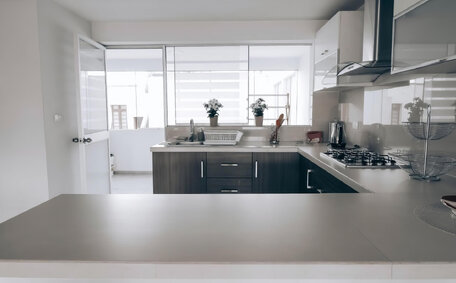Understand What Causes Sink Drain Blockages
This guide offers practical steps to prevent blockages in your drainage system effectively. These are common causes for clogged drains if washed down the sink:
- Food waste - Coffee grounds, grease, oil, and food scraps can adhere to the inside of pipes, accumulate in your drainage system, and gradually obstruct water flow.
- Hair - Strands of drain hair can get tangled and trap other debris, forming a dense clog.
- Grease and oil - Fats, oils, and grease wash down the drain but then cool and harden on drain pipe walls, narrowing the pipe opening.
- Tree roots and leaves twigs - Over time, roots from outdoor trees and shrubs, along with leaves and twigs, make their way into cracks and joints of drainage pipes, obstructing water.
- Excess detergent - Too much washing powder residue can build up inside pipes.
Understanding what leads to blocked drains is essential for effective prevention. If you know what substances commonly block drains, you can modify behaviours and maintenance habits to avoid plumbing backups.
Use Strainers and Drain Covers
Sink strainers and drain covers are highly effective at preventing common debris from entering your home’s pipes. These devices are placed over or inside your drains to capture food scraps, hair, and other particles while you wash up.
Strainers and drain covers act as a barrier, allowing water to pass while capturing solids.
Regularly rinse your kitchen sink strainers to prevent oil and grease buildup. Additionally, fully unscrew and clean them out at least once a month. Taking this maintenance step when doing your kitchen sink cleanup is crucial for keeping your strainers from becoming overly clogged, ensuring they continue filtering out particles.
Installing a drain strainer and drain covers is a simple method of drain pipes cleaning and works as a defence against future drain clogs. Be conscious about what goes into your drains and use strainers to catch anything that could cling to pipes.
Using these devices, alongside mindful sink habits, significantly lowers the risk of blockages. For recurring blocked drain issues, it’s advisable to get in touch with a professional plumber.
Properly Dispose of Food Waste
It is essential to Correct disposal of food waste is crucial to prevent fats, oils, and grease from clogging drains. Food particles like coffee grinds, rice, pasta, and oil can make their way into the pipes and accumulate over time.
Compost Food Scraps
Composting food waste like fruit and vegetable peels or eggshells is an eco-friendly way to get rid of kitchen waste. Dedicate a small bin for food scraps and empty it into your garden compost area weekly.
Throw Food in the Trash
For non-compostable items like meat, dairy, oil, wet wipes, and cooked food, using your garbage disposal bins effectively is the way to go. Ensure items have cooled before sealing them in a bag.
Recycle Cooking Oil
Instead of pouring used oil down drains, strain and store it for proper disposal. When you have one litre accumulated, drop it off at a disposal location to be recycled into other types of products like biodiesel.
By disposing of waste correctly, you help maintain clear drains and reduce environmental impact. Adopt greener waste habits to avoid plumbing issues.
Avoid Pouring Fats, Oils and Grease Down Drains
It’s important not to pour oils down your drains. Grease and oil can find their place in pipes and drains can become clogged over time. There are several ways to dispose of oil and grease properly, rather than pouring them down the drain:
Let Grease and Oil Solidify
After cooking, allow any leftover oil, grease or fat to cool and solidify in the pan or container. Once hardened, scrape it into your garbage bin for disposal rather than rinsing into drain.
Use Paper Towels
Before washing, use much toilet paper or paper towels to soak up excess grease and oil from cookware and plates, instead of sending them down toilet. Ball up the towels and throw them in the trash to Keep these substances out of a potentially blocked sink and maintain clear plumbing.
Collect used cooking oil in a container with a tight lid rather than pouring it out. Once you have about a litre, drop it off at a disposal location to have it recycled into fuel or soap products.
Keeping cooking grease and other fats and oils out of drains helps to lead blockage away from the pipes. Find their benefits to improve your plumbing system’s health.
Clean Pipes with Boiling Water
There are several measures you can regularly perform to prevent blocked sinks. Some hot water can break down built-up grease, fat, and oil that end up pipes over time. As it passes through plumbing, boiling water cleans the sides of pipes.
Using boiling water is preferable to chemical drain cleaners, as they can damage pipes or cause toxic reactions. However, take care when pouring hot water down sensitive drains, and let boiling water, a natural drain cleaner, cool down slightly before applying it directly over stainless steel sinks at your local home.
How It Helps
Grease, soap residue, hair, and food particles can easily adhere to pipe interiors. As waste water carries these materials their way down through the plumbing system, they leave behind a sticky film. Over months or years, this substance can take hold trapping other passing debris until significant blockages form.
Boiling water down the drain creates turbulence that scrubs pipe walls and dislodges residue. This turbulence helps clear out built-up gunk and suspends it in the water. It then goes down your drain pipes completely or is caught by a functioning P-trap.
Tips for Success
To effectively clean pipes, bring water to a rapid boil on the stove or in an electric kettle.
Carefully transfer it to a heat-safe vessel, then pour the hot water into your drain slowly. One litre weekly works well for prevention. You can scale up to three litres for an existing clog.
Particularly attend to your kitchen and bathroom drains if you notice slow drainage. With consistent boiling water treatment, you should see improved water flow in your pipes. Combining this with sink strainers and prevent clogged pipes and provides complete drain care.
Try DIY Unblocking Methods for Minor Clogs
For minor clogs, there are a few DIY methods you can try before calling a professional:
Baking Soda and Vinegar
Mix half a cup of baking soda with a cup of warm water and pour down the drain. Follow with a cup of heated white vinegar, cover the drain for 5-10 minutes to allow the fizzing reaction to tackle the clog. Then flush with some hot water down drain to thoroughly clear any drain clog remnants.
Plunger
If your sink has an overflow hole, plug it with a wet rag or towel and fill the sink halfway with water. Forcefully plunge up and down for 1-2 minutes to apply pressure to the clog.
Snake
You can use a plumbing snake or small drain snake to break up clog and pull out buildup hair and debris. Slowly turn the handle as you feed the snake down the pipes.
While chemical drain cleaners may be convenient for minor issues, they can harm your pipes over time. For tougher obstructions, you should never hesitate to contact a professional to inspect and clear the drains.
Know When to Call a Professional Plumber
While DIY methods can temporarily relieve minor clogs, certain persistent or severe drain issues require professional assistance. There are a few key signs indicating you should contact a plumber:
Recurring Blockages
Frequent clogs in the same sink or drain may indicate an underlying issue requiring expert diagnosis. Such issues could be due to pipe damage, root invasion, or fundamental design flaws.
Multiple Blocked Drains
When multiple sinks or drains within your home’s system suddenly back up without explanation, Call Erskine Park Plumbing immediately at 1300 349 338 or email us to inspect for major obstructions.
Backflow Issues
If water flows back up through drains unexpectedly or you notice gurgling sounds from plumbing vents, a serious main sewer clog may be present. Professionals have the tools and experience necessary to clear clogged drains and avoid hazardous situations.
Involving a licensed, insured plumber early can minimise the costs associated with serious drain blockage repairs. Professional clearing is often more cost-effective in the long term than repeatedly purchasing store-bought drain products.
Should you suspect recurring blockages are due to outdated pipes, tree root infiltration, or other significant issues, Erskine Park Plumbing can inspect and advise on plumbing upgrades within your budget.
Don’t hesitate to email or phone 1300 349 338 to schedule a consultation if you experience persistent drain problems within your property.






